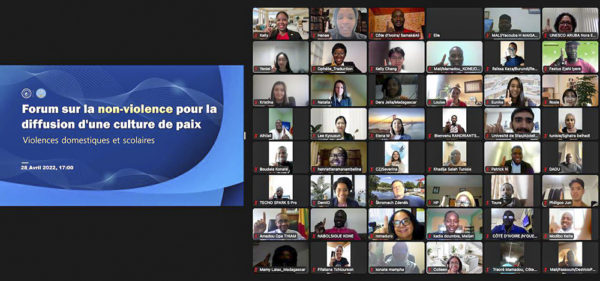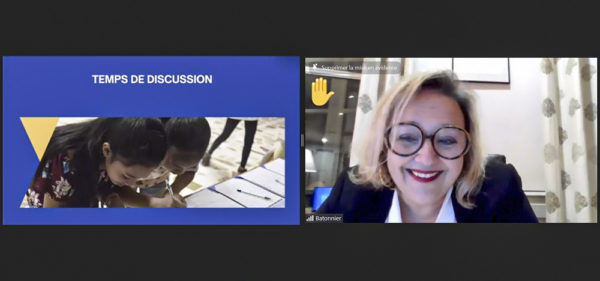WEBINAR REPORT
“Non-Violence Forum to Spread a Culture of Peace”


Date and Time: Thursday, April 28th, 2022, 17:00PM(MESZ)
Location: Online (Zoom)
Topics: Non-Violence, Human Rights
Host: HWPL Northern Seoul & Gyeonggi Branch
Speakers:
Mrs Christine Maze, France, President of the Bordeaux Bar Association in France
Ms. Minerva Kadar Afonso, Spain, Delegate of the Alma Association against Gender Violence in Spain
Mr. Mohamed Diawara, Mali, Professor of ESC school in Mali
Mr. Ali DAOU, Mali, Person in charge of the culture program at the UNESCO Office in Bamako
Mrs. Bouchra Sirsalane, Elected official and Administrator of the CCAS of the City of Puteaux in France
Dr. Maria Hadjielia Drotarova, Cyprus, Lecturer at CTL Eurocollege, Limassol
Dr. Thomas Smith, USA, Teacher at Martin Luther King Jr. High School in Atlanta
“Non-Violence Forum to Spread a Culture of Peace” was held to identify possible responses to the problems of violence in order to spread a culture of peace.
“This violence must stop. It no longer has its place in the 21st century. The positive change associated with it is quite possible. It has, moreover, begun to occur. It must continue and be further consolidated, until it becomes a very satisfactory reality.”
– Mr. Amadou Opa Thiam, Ambassador at the Permanent Delegation of Mali to UNESCO-
“I would like to point out the necessity of building and promoting together a culture of peace and non-violence. It must remain primordial in our minds and in our hearts. “
– Ms. Anna Bossman, Ambassador at the Permanent Delegation of Ghana to UNESCO
“Peace education not only solves the violence that can occur in our daily lives, but it educates each person to peacefully solve problems through nonviolent methods.”
– Dr. Thomas Smith, Teacher at Martin Luther King Jr. High School in Atlanta, USA
Introduction Webinar
On April 28th, 2022, HWPL (Heavenly Culture, World Peace, Restoration of Light), in collaboration with the Permanent Delegation of Mali to UNESCO hosted an online webinar titled “Non-Violence Forum to Spread a Culture of Peace”.
The webinar was held to identify possible responses to the problems of violence in order to spread a culture of peace and be aware of the role we can play today in the prevention and resolution of societal problems such as violence, human rights violations and discrimination.
Ambassador of Mali, Mr. Amadou Opa Thiam and Ambassador of Ghana, Ms. Anna Bossman delivered a congratulatory address and Ambassador to the Permanent Delegation of Mozambique to UNESCO, Mr. Alberto Maverengue Augusto, and Secretary General Benin National Commission, Mrs. Adélaïde Fassinou Allagbada sent a short video message.
Three speakers, Mrs. Christine Maze, Ms. Minerva Kadar Afonso and Mr. Mohamed Diawara, spoke on the topic of domestic violence. Followed by four speakers, Mr. Ali Daou, Ms. Bouchra Sirsalane, Dr. Maria Hadjielia Drotarova and Dr. Thomas Smith who gave a speech on the topic of school violence.
Background Information
Each year more than 1.6 million people die as a result of violence. It is one of the leading causes of death among age of 15 to 44. A person can be exposed to violence in many ways: as a direct victim or as a witness to violence in their society, community, school home, or even online. When it does not result in death, violence also causes many physical and emotional injuries to its victims who may also experience mental distress and a reduced quality of life. Being exposed to violence can have serious short- and long-term health effects, including feelings of insecurity, behavioural problems, depression, anxiety and post-traumatic stress disorder.
In fact, quarantine, movement restrictions and stay-at-home measures to contain the spread of infection after COVID-19 have contributed to a sharp rise in domestic violence. In addition, as the online activity of children and youth increases due to national lockdowns and widespread school closures, students are now exposed to cyberbullying as well as bullying in school. Violence is a phenomenon that can take many forms, from the “invisible” suffering of the most vulnerable to the all too visible tragedy of societies plunged into conflict. It permeates our daily lives, our homes, our schools and our society. It can be physical, verbal or psychological. We need to know more about the factors that cause violence, and identify possible solutions in different sectors of society. We must remember that safety and security are not something that can be taken for granted: they are the result of a collective consensus and public investment.
Through this webinar, two main topics, domestic violence and school violence, were addressed. The speakers shared about the current situation of domestic violence in each country and what should be done to resolve it. And speakers on the second topic shared the current situation of school violence and cyberbullying. Some speakers emphasized on the importance of education including peace education to reduce these kinds of violence.
Points of discussion
[Topic 1]
Mrs. Christine Maze shared the current situation of domestic violence in France. In particular, she highlighted that victim of domestic violence are not only women but also children. She emphasized that more concrete and actionable measures should be taken to address domestic violence in France in the future, while explaining that Spain is a good model.
Ms. Minerva Kadar Afonso introduced the definition of domestic violence, the current situation of domestic violence in Spain and the actions being taken in relation to it. She emphasized that children are also victims and this has serious impact on them who are our future and new generation. She said that swift action must be taken by educating professionals to recognize the issue of domestic violence, and that it is also important to unite the countries to solve this issue.
Mr. Mohamed Diawara commented on the current situation of domestic violence and protests against domestic violence in Mali, and informed about the various movements of citizens to adopt laws. He pointed out that the training of professionals from all walks of life in the fight against violence, in particular within the domestic circle, and the prevention of violence, especially by teaching mutual respect between girls and boys in the educational system, from the earliest age, are important issues.
[Topic2]
Mr. Ali Daou addressed how violence imposed on our children, especially terrorism, jihadism and all that follows, has psychological effects on the progress and intellectual growth of children. And in Mali, spaces have been created to bring people to discuss in case of internal conflict and these spaces have been extended to the national level to bring people to reconcile starting from societal values.
Ms. Bouchra Sirsalane shared the statistics of cyber-harassment and cyber-violence in France. She emphasized on the need to put in place concrete actions like more interventions in schools with trainers or professionals of personal development, and to educate and train students to behave ethically and responsibly on social networks. She also mentioned the need to strengthen and generalize at the national level, media education, digital education for students so that each student can make a responsible use.
Dr. Maria Hadjielia Drotarova focused on the importance of education. She explained how recent research shows that the earlier children are introduced to knowledge of peace and practice related skills, the more likely they are to become agents of positive change in the future.
Dr. Thomas Smith also highlighted the role of peace education. He explained how students need to feel comfortable in school, and by providing peace and nonviolence education it can help students and teachers be fully equipped to deal with problems of bullying, which is a form of violence. He also mentioned that this education can reach great heights and encourage middle and high school students to become leaders, messengers of peace and advocates for society as peaceful citizens in the global community.
Highlights
Mrs. Adélaïde Fassinou Allagbada:
At the moment, we are witnessing a terrible war between Ukraine and Russia and we, the fighters for peace, must indeed put ourselves on the front line and speak, speak, speak, fight, fight, and work towards concord, towards world peace.
Ms. Christine Maze:
A lot of efforts are being made today by France to really tackle this issue head on.
Ms. Minerva Kadar Afonso:
I emphasize a lot on the “against children” because they are the future generations to come and if we don’t protect them, if we don’t really do everything to keep them out of this violence, they will reproduce it as the speaker just before me said. It will continue to happen.
Mr. Mohamed Diawara:
In this context of mobilization which must find an echo at the departmental level, training professionals from all walks of life in the fight against violence, particularly within the marital circle, and the prevention of violence, in particular by teaching mutual respect between girls and boys in the education system, from the earliest age, are important issues.
Mr. Ali Daou:
This is why we have to take all this into the school environment so that it can serve as a basis for getting people to agree on the essentials and inculcating in them a culture of peace.
Ms. Bouchra Sirsalane:
We must launch citizen initiatives in our cities, because we are all concerned by this scourge.
Dr. Maria Hadjielia Drotarova:
As we know Education is the foundation, the bedrock of human transformation. As a veritable source of socialization, education has the potential to reinforce a sense of peace in its receiver.
Dr. Thomas Smith:
The goal for peace education in the classroom is to develop a cohort, a group of people with shared characteristic who value peace and dedicate their lives to live a life of nonviolence.
Next Steps
Our next step is to establish a network of NGOs and associations from all backgrounds to solve non-violence problems and to expand the implementation of peace education to spread the culture of non-violence within UNESCO.
>> Download the Webinar Report













